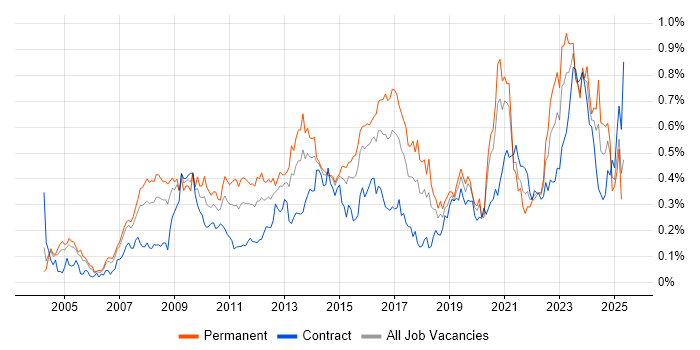Enterprise Architect
Central London > City of London
The median Enterprise Architect salary in the City of London is £105,000 per year, according to job vacancies posted during the 6 months leading to 20 May 2025.
The table below provides salary benchmarking and summary statistics, comparing them to the same period in the previous two years.
| 6 months to 20 May 2025 |
Same period 2024 | Same period 2023 | |
|---|---|---|---|
| Rank | 136 | 158 | 186 |
| Rank change year-on-year | +22 | +28 | +77 |
| Permanent jobs requiring an Enterprise Architect | 6 | 15 | 51 |
| As % of all permanent jobs advertised in the City of London | 0.29% | 0.45% | 1.10% |
| As % of the Job Titles category | 0.32% | 0.47% | 1.15% |
| Number of salaries quoted | 3 | 15 | 15 |
| 10th Percentile | £93,000 | £85,000 | £92,000 |
| 25th Percentile | £93,750 | £90,000 | £96,250 |
| Median annual salary (50th Percentile) | £105,000 | £95,000 | £107,500 |
| Median % change year-on-year | +10.53% | -11.63% | +11.69% |
| 75th Percentile | £119,375 | £115,000 | £115,000 |
| 90th Percentile | £122,000 | - | £117,500 |
| Central London median annual salary | £105,000 | £95,000 | £107,500 |
| % change year-on-year | +10.53% | -11.63% | +19.44% |
All Permanent IT Job Vacancies
City of London
For comparison with the information above, the following table provides summary statistics for all permanent IT job vacancies in the City of London. Most job vacancies include a discernible job title that can be normalized. As such, the figures in the second row provide an indication of the number of permanent jobs in our overall sample.
| Permanent vacancies in the City of London with a recognized job title | 1,896 | 3,198 | 4,447 |
| % of permanent jobs with a recognized job title | 93.22% | 96.01% | 96.21% |
| Number of salaries quoted | 1,452 | 2,526 | 3,731 |
| 10th Percentile | £41,250 | £41,250 | £42,000 |
| 25th Percentile | £52,500 | £53,750 | £55,000 |
| Median annual salary (50th Percentile) | £72,500 | £73,000 | £75,000 |
| Median % change year-on-year | -0.68% | -2.67% | +3.45% |
| 75th Percentile | £95,000 | £95,000 | £97,500 |
| 90th Percentile | £120,000 | £112,500 | £112,500 |
| Central London median annual salary | £72,500 | £72,500 | £73,210 |
| % change year-on-year | - | -0.97% | +0.98% |
Enterprise Architect
Job Vacancy Trend in the City of London
Job postings that featured Enterprise Architect in the job title as a proportion of all IT jobs advertised in the City of London.

Enterprise Architect
Salary Trend in the City of London
3-month moving average salary quoted in jobs citing Enterprise Architect in the City of London.
Enterprise Architect
Salary Histogram in the City of London
Salary distribution for jobs citing Enterprise Architect in the City of London over the 6 months to 20 May 2025.
Enterprise Architect Skill Set
Top 30 Co-occurring Skills and Capabilities in the City of London
For the 6 months to 20 May 2025, Enterprise Architect job roles required the following skills and capabilities in order of popularity. The figures indicate the absolute number co-occurrences and as a proportion of all permanent job ads across the City of London region featuring Enterprise Architect in the job title.
|
|
Enterprise Architect Skill Set
Co-occurring Skills and Capabilities in the City of London by Category
The follow tables expand on the table above by listing co-occurrences grouped by category. The same employment type, locality and period is covered with up to 20 co-occurrences shown in each of the following categories:
